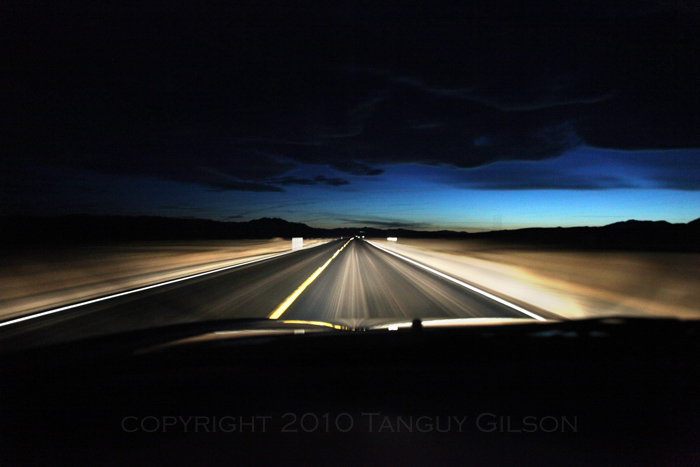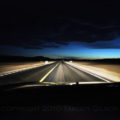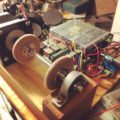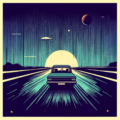The Night Ride Storyteller Project is a robotic radio producer that gathers user-contributed personal narrative and music, using heuristic algorithms to produce an aural collage of personal stories and music, making the results available through streaming and podcasts.
Introduction
The Night Ride Radio Storyteller Project is a robotic radio show producer that combines web-contributed personal stories to create a dreamy aural collage of music and narrative.
From 2001 to 2006 I produced a weekly radio show on public radio. Night Ride is all about the narrative voice, written as in literature or spoken as in oral history. Human beings traffic in stories. Let me tell you about my day, my life, or something that happened to me once upon a time. They take you to other places, other times, music and stories and dreams. (Night Ride Radio archives)
This technology project takes what I learned about radio production and personal storytelling and combines it with my knowledge of heuristic programming and web development to create an opportunity for people to share their personal stories.
Statement of Need
Everyone has personal stories. Telling stories is how we relate to each other as humans. Personal oral history is one of the oldest and most enduring forms of entertainment, from some prehistoric campfire to Prairie Home Companion last Saturday.
While there are a few significantly noteworthy radio productions and podcasts focused on personal narrative such as This American Life, The Moth, Transom.org, and StoryCorps, there are very few easily accessible methods to gather people’s personal stories and relatively few channels to share the multitudes of stories out there.
The Night Ride Radio Storyteller Project gathers people’s personal narratives via web contribution. It combines these web-contributed personal stories by subject and mood with contributed and open source music in a dreamy aural collage of music and story. These robotically produced radio shows are made available on the web via stream or podcast.
For this pilot project, the robot producer will create a Night Ride-style radio production. However, the technology can be repurposed to create an automated web stream on any subject or with any kind of tone.
Objectives
The objective of this project is to build the Night Ride Radio Storyteller front to back and have a pilot in production.
Deliverables include the web-contribution component, the automated production robot, the listener web frontend, a significant number of contributed seed stories and open source or contributed music, and have a built-out scaleable infrastructure to support the project.
Methods
The project can be broken into software and content tasks. Some of this work can be done concurrently.
Software Tasks
Software development will be produced using adaption of a project planning method I am familiar with from my work at the University of California Santa Cruz, the Information Technology Services Project Management Methodology.
There are four major software tasks:
-
- Web-based contribution software — including a simple clean contribution frontend, web infrastructure for metadata gathering, audio gathering, converting and organizing audio, and content moderation by privileged users.
- Automated production robot — including processes for choosing show topics, selecting story audio, selecting music, pairing music and story, planning optimum pacing, assembling chapters and shows according to “recipes,” and recording usage
- Listener web frontend — including a web stream for listeners to hear shows on the fly, an archive of podcasts
- Web 2.0 infrastructure — including flexible authentication, a production blog, automated contributor notification, listener comments, social network sharing, and so on.
Content Tasks
There are three major content tasks:
-
- Gather personal narrative. In the production-version of the project, stories will come from web contributions. In the pilot project, I will gather existing personal narrative with permission or from creative commons sources. The goal of the pilot project is to have 72 hours of production-quality narrative.
- Gather music. This music will be used for music beds behind narrative and as features between stories. This will come with permission of from open source or creative commons sources.
- Cook up radio production recipes for robot. These are tricks a radio producer uses to create a mood within a show. These work in partnership with the metadata and audio gathered at the web-based contributor frontend.
Evaluation
Measurables include delivery of frontend and backend software according to original design criteria, enough seed stories and music to produce 72 hours of production without repeating significant content. During the project, software progress will be evaluated according to a project plan weekly.
The goal of the pilot is to enlist one dozen regular audio contributors, drawn from storytellers’ groups, radio producers, and friends. Half of this number will be enlisted early to test and explore newly developed features.
Timeline
This is a very rough timeline:
| Gather requirements | Jun 2013 |
| Create project plan | July 2013 |
| Research technology | Aug 2013 |
| Enlist early batch radio contributors | Aug 2013 |
| Gather test audio | Aug 2013 |
| Program automated production robot | Sep 2013 – Nov 2013 |
| Create initial robot recipes | Dec 2013 |
| Design detailed contrib flowchart | Dec 2013 |
| Program web-based contribution software | Jan 2013 – Mar 2013 |
| Create final robot recipes | Mar 2013 |
| Program listener web frontend | Mar 2013 |
| Gather content | Apr 2013 |
| Program web 2.0 infrastructure | May 2013 |
| Enlist final list of radio contributors | May 2013 |
| Final testing | May 2013 |
| Launch | Jun 2013 |
Budget
The grant will principally be used to make it possible for the developer to concentrate his time on this project and pay modest stipends to artists and professionals helping out with the project.
| Developers | |
| Project Manager* | $500 |
| Lead Developer/Artist | $3000 |
| Jr. Developer* | $500 |
| Designer* | $500 |
| Hosting | |
| Development | $200 |
| Final | $100 |
| Software and Licensing | |
| Audio Software | $100 |
| OS Licensing | $100 |
| Total | $5000 |
| * small stipend to enlist the dedicated services of fellow artists/technologists | |





